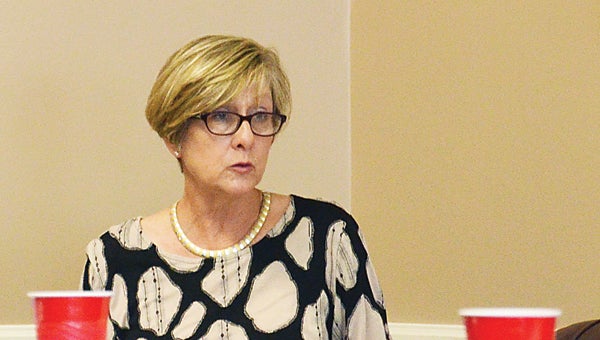Lawsuit settled: Carter County Tomorrow signs memorandum of understanding
Published 8:02 am Friday, April 29, 2016

Star Photo/Rebekah Price Workforce Development Complex Director Kim Eggers details the current needs of the complex and funding available for the repairs to the roof and addition of the elevator.
Following Carter County Commission approval last Monday, the Carter County Tomorrow (CCT) unanimously approved an agreement Thursday to settle a lawsuit filed by the county in August.
Though the lawsuit is behind them, decisions will still have to be made regarding CCT assets, including the Workforce Development Complex (WDC).
The agreement signed by attorneys from both parties will shorten the lease agreement of the complex by the county to CCT to six years, cutting it in half and ending the term of the lease agreement on July 31, 2022. The agreement states CCT agrees to use its best efforts to maintain the existing relationships with the current sublessees, including Northeast State Community College and others.
By the amended lease term, the CCT has agreed to install an elevator and to repair the roof on building one of the two-building complex. At the meeting Thursday, motions unanimously passed to move each of these projects forward.
When discussing funding priorities for the projects, one of three of the board’s acting presidents, Sam LaPorte, said, “The roof is more critical than the elevator.”
Kim Eggers, director of the complex agreed, though she and others said both were important.
“All I know is our building one is in dire need of a roof before it does cause structural damage,” she said.
The board approved replacement of the roof of building two in May 2014 for a four year forgiveness of rent, to cover the $154,000 cost. Eggers reported that cost is down to $89,000.
The annual income for the complex is more than $420,000. The greatest expenses for 2015-16 were allocated at $131,000 for salaries, $129,000 for utilities, $68,000 for insurance $45,200 for contract labor, and $21,600 for maintenance expenses. Net income for the year was budgeted at $2,500. The total CCT fund balance is at about $99,000, Eggers said.
Economic Development Director Jon Hartman questioned whether they would cover the cost of the projects from the fund balance or with loans.
“Clearly you’re not going to pay both out of fund balance, one’s going to have to be a loan,” Hartman said.
Eggers said the WDC has $148,000 in its fund balance and they would likely pay for the roof from that balance.
Eggers said the roof repair is estimated to cost $57,180, and the elevator may cost around $100,000.
“If the CCT funds transfer, we could pay for the elevator out of CCT funds,” Eggers said. “We’ve run into a little bit of complications on the elevator.”
The elevator was discussed in March 2012 at a Carter County Commission meeting, where it was suggested along with a 17 year lease extension in order to make the upstairs more accessible and to add classrooms. In a CCT meeting in April 2012, former President Tom Anderson said they would be using community facility funds through USDA to cover it. Funding for its construction was not determined Thursday, though members agreed it was important to make the upstairs handicap accessible. Eggers said the upstairs was still vacant.
Before they can get quotes from a contractor for the elevator, she said they will have to have architectural drawings. She said Steven Hutton is very familiar with the building and has done most of the drawings they have needed in the past including drawings for the biology lab. The board unanimously approved a motion to get drawings at a maximum cost of $3,000, though Eggers thought they would not cost more than $2,500.
For the roof, the board had to decide between two companies. Board Member Ken Markland and Watauga Mayor Delissa Lafleur noted some differences in their plans and in materials used, like the membrane on the roof.
Board member Sonja Culler made a motion to approve the contract with LaFerney Commercial Roofing because it would come with a 15 year warranty to cover labor and materials for additional repairs. Bill carter seconded the motion and the board approved unanimously, on the condition that WDC maintenance director compare the two plans further to decipher material differences.
Though Chairman Richard Tester said the WDC has been criticized, he said the two buildings are old and they’ve done their best to correct those issues.
“The Workforce Development Complex building is in better condition today than it ever has been, thanks to the maintenance crew and Kim; they are constantly on the move working,” Tester said.
In other news, following orders of the state Comptroller to better record and approve spending by the board, members unanimously approved new credit card policies and procedures. CCT issues a credit card for job-related expenses, and personal purchases are prohibited, the policy says. Cardholders are required to be approved by the president and must sign the cardholder agreement. Receipts must be submitted to the bookkeeper for verification and approval by the president.
Regarding economic development, Hartman reported that Jamie Matheson approved the marketing for his property, also known as the Alcoa Building. This was recommended by the state in a Property Evaluation Program report recently returned to CCT.
Hartman said bidding for phase I environmental studies are underway, which will help make the building more appealing to prospective industries. The property is now listed on the City of Elizabethton website as well as on the Tennessee Valley Authority website, he said.
He reported that Milligan College’s acquisition of the Emmanuel School to turn it into a facility for new mechanical and electrical engineering programs will be attractive to prospective industries as well as equipping the community with a stronger workforce.



